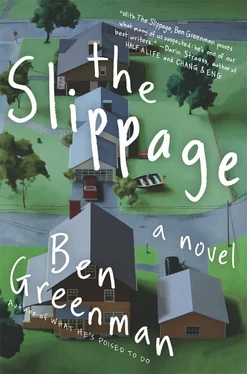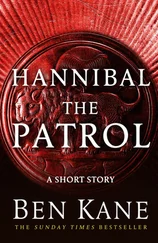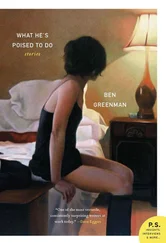“So what happened?” William said. “It ended?”
“It did.”
“And now you’re reconsidering? She is?”
Tom ate a little more of his sandwich, seemed to taste it less. He scratched along his chin. “We had a son,” he said.
William started to speak, but Tom, having started up again, wasn’t stopping. “It was about a year after we got together. We were ecstatic. He was the last piece of the puzzle. Big baby, laughed all the time, a real bruiser. He started walking the day after his first birthday, and we used to joke that you could feel the ground shake when he put his foot down. Then he started fainting. We took him to the doctor, who said it was convulsions from high fever. One morning Jesse went in to wake him up. His lips were blue. We got him to the hospital right away, but right away wasn’t soon enough.” William understood now; Jesse hadn’t been pointing at the ground, but rather beneath it. He was one and a half, Tom said, and that’s the age he stayed. “He had an underlying cardiac problem, something called long QT syndrome. It’s named after the part of the cardiogram that widens.” His fingers, deft from practice, drew a graph on the table. “When people say ‘dead and gone,’ what do they mean? Where do they think people go, exactly?”
William didn’t know what to say. “Louisa never mentioned anything.”
Tom let William wait for a while. He was looking past William, into the middle distance, and for once he didn’t seem as if he wanted to be seen. “That’s because she doesn’t know,” he said. “We weren’t talking for a few years there before I moved upstate: sister with happy, settled life doesn’t seem to care about brother with unhappy, unsettled one, to the point where, even when brother moves a few hours away and his life starts to come together, he doesn’t feel comfortable calling her. And then, when Jesse and I split up, I did anything I could not to think about it, which included not mentioning it to anyone. I got rid of most of the photographs, kept only one where he was sleeping in the crook of Jesse’s arm and one of him sitting up in bed. I didn’t want the rest of them because I didn’t understand what they were documenting. That’s when I started making charts, in fact. It was my way of struggling with facts and what happens to them when they’re no longer true in any measurable way.” Tom made a funny birds-fly-away gesture that didn’t belong to him at all, or to any man William knew. Maybe it was something Jesse had done. “When Louisa told me about the job at the college, I wasn’t sure I wanted to be only a few hours away from Jesse, wasn’t sure I could. But I took the job and didn’t think about her, except to think that maybe one day I would go see her. I got my courage up, lost it, got it back again. Once or twice I called but hung up when she answered. It was a mess. I was a mess. Then, a few weeks ago, I was here working. I was trying to think of what the baby looked like and I couldn’t,” he said.
“What was his name?”
“Michael.” The word crossed the space between them. “That was the day I went to the old studio. It wasn’t there. I broke down and called Jesse and managed to say hello when she answered. We started talking, carefully at first, about why we ended things, about how our lives had gone, about what we remembered and what we needed to remember. She agreed to let me come and see her. You were my ride. I had all the hope in the world. Then, last night, she said she didn’t think she could make a go of it.” He finished off the second beer, closed his eyes, and sat back in his chair. He looked completely bereft and, despite the fact that his eyes were closed, more like Louisa than ever. “So that’s that,” he said. “I guess it’s what the experts call closure.”
“I’m sorry,” William said, hearing the words emerge without any sense or meaning, and gradually the rest of the room returned: the men at the bar wrapping up the conversation about their ski trip, the intolerable sandwiches, the lottery machine strobing green.
Tom threw a twenty and two fives on the table. “Let’s get the hell out of here,” he said with great spirit.
The convenience store connected to the restaurant was stocked densely with chips, candy bars, sticks of meat, and a rainbow of sugared waters. The woman at the counter was speaking in rat-a-tat Chinese but understood enough to hand William down the pack of gum he wanted and to give Tom a small envelope of aspirin. Out in front, on a bench, there was a man about William’s age and a boy, no more than ten, stroking his father’s arm and looking impassively into the parking lot. One of them might have been blind. In the car, a few miles later, William mentioned them to Tom, but Tom was no longer with him. He had been musing on the passage of time, wondering whether people moved through it or vice versa, and he quoted Shakespeare on the matter, “I wasted time, and now time doth waste me,” and that last word had launched him into sleep.
And so William was back home, which meant planning the party Louisa had suggested, and checking on progress at the new house, and sitting on the deck of what would soon be the old house and watching the trees whose names he did not know sway in the breeze. He was trying to do some reading, too. Tom had encouraged him to pick up Cranston’s self-help book; the first time he had dismissed the suggestion, because it was the afternoon when he’d accused Tom of arson, and that day was best discarded wholesale. But on the drive home Tom mentioned it again, and William was in no real position to resist. He found a used copy, a compact paperback with a burnt-orange cover, and dipped into it whenever he had the time.
It was mostly unreadable, or rather readable only in bursts so short that the process could not fairly be called reading. The text was densely uninteresting, filled with bromides about life’s triumphs and trials illustrated with anecdotes drawn from Cranston’s own unremarkable experience. Still, something in the third chapter had caught his eye. “Life,” Cranston wrote, “is a series of substitutions designed to distract you from the fact of your deprivation.” The idea stayed with William. He had tried to forget about the loss of his job by spending time with Emma, and tried to forget about Emma by spending time with Christopher. Now, without Christopher, he was substituting again, with Cranston. But that would go soon, too, and something else would take its place. None of the options was satisfactory, but none was any less satisfactory than the rest, and even the first link in the chain, his job, was only helping him to cope with some other absence or emptiness. Recognizing this all as an endless cycle made him feel marginally less deprived, and he wondered whether he actually was laying down the foundation for a better understanding of himself. It was a cheering proposition, and it propelled him through the wasteland of chapters four and five.
In chapter six, another insight came forward. “An unhealthy impulse,” Cranston wrote, “should never be discharged in action, but can never be completely defeated by inaction; rather it should be concealed from the view not only of others, but of the possessor of that impulse.” A feeling of recognition circulated hotly through William, who underlined the passage and put a star in the margin.
For weeks during the summer, William had been keeping two secrets, one professional, the other personal, and he thought that when he came clean about his job, it would be easier to withhold the facts about Emma. Instead, when he disclosed his professional secret, he felt the personal one growing inside him with increasing pressure, trying harder with each day to break free. After the trip upstate with Tom, though, the count was back to two again, and he was calmer. “Maybe the second acts as a kind of buffer,” William said. “This way, if I have a sudden attack of honesty, I’ll just spill the thing about Tom and Jesse. Don’t you think?” Blondie didn’t answer.
Читать дальше












